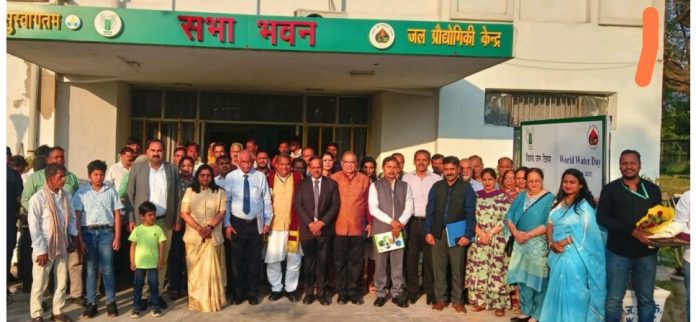New Delhi, March 22, 2025 : Water Technology Centre (WTC), ICAR-Indian Agricultural Research Institute (IARI), New Delhi organized World Water Day Programme on Central Theme i.e. ‘Glacier Preservation’ on 22.03.2025 (4PM to 5.30 PM) at WTC Auditorium. The main objectives of the Programme are (a) Analyzing the present status of glaciers in India and other nations in the backdrop of climate change and (b) Devising integrated action plan for sustainable and climate resilient water management for ensuring water and food security. The expected outcome of this programme in the form of technological and policy options for glacier preservation and sustainable and climate resilient water management in agricultural sector will aid in achieving the targets under Sustainable Development Goal (SDG) 6 of the United Nations (Ensure availability and sustainable management of water and sanitation for all) and SDG 13 (Climate Action).
This occasion was graced by Dr. A.K. Singh, Formerly DDG (NRM), ICAR and Vice Chancellor, RVSKVV, Gwalior as Chief Guest. Dr. T.K. Behera, Director, ICAR-IIHR, Bengaluru graced as Guest of Honour. Dr. C. Viswanathan, Joint Director (Research), IARI Dr. R.N. Padaria, Joint Director (Extension), IARI Dr. P.S. Brahmanand, Project Director, WTC, IARI were also present during this event. Dr. Brahmanand gave brief presentation on the current status of glaciers in different countries with special focus on melting rate of Himalayan Glaciers in the backdrop of climate change and measures for glacier preservation. He informed the house that the number of glaciers in the Indian Himalayas is about 9,575 as per the report of The Geological Survey of India and some glaciers, like Chuma and Onglaktang, have retreated at rates of 3.9 and 4.3 meters per year, respectively, from 1988 to 2018. Chief Guest Dr. A.K. Singh explained about the impact of higher rate of glacier melting on sea water level rise and urgent need to practice climate resilient water management practices. He also stressed on the advanced technologies for efficient and sustainable utilization of groundwater resources in coastal and inland areas, enhancing area under micro irrigation and water quality management. Guest of Honour Dr. Behera mentioned that the water use efficient practices like drip fertigation and mulching need to be practiced in water scarce areas of India and priority should be given to crop diversification with low water requiring pulse, oil seed and horticultural crops.
Dr. Viswanathan emphasized on the need for enhancing per capita storage of India through creation or renovation of higher number of rain water harvesting structures and public awareness campaigns on rainwater conservation and water use efficient practices in irrigated commands. Dr. Padaria briefed the house about importance of participatory water resource development and renovation and management of rainwater harvesting structures through community engagement models. The second Issue of Hindi Magazine ‘Jal Suraksha’ (Chief Editor : Dr. A.K. Mishra, Principal Scientist, WTC) published by Water Technology Centre, ICAR-IARI was released by the Chief Guest and Guests of Honour on this occasion. Overall, about 100 delegates comprising of researchers, academicians, staff and students of ICAR-IARI, ICAR-NBPGR, International Water Management Institute and other institutes located in New Delhi and CSKHPKV, Palampur have actively participated in this programme. Dr. Vijay Kumar Prajapati, Scientist, WTC coordinated this programme.

